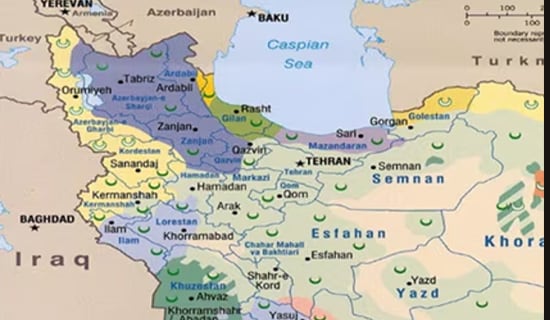
Governor Salman Taseer with blasphemy convict Aasia Bibi
On January 4, 2011, just a few hours after the assassination of Salman Taseer, the governor of Pakistan's Punjab province, more than 500 Pakistani religious scholars and clerics issued a statement, lauding the assassin for keeping alive a "tradition of 1,400 years in Islam" which requires the killing of anyone committing an act of blasphemy against Prophet Muhammad. Most of the clerics and religious scholars belong to Jamaat Ahle Sunnat Pakistan, a coalition of Barelvi organizations.
While Salman Taseer, an outspoken voice for secularism and pluralism in Pakistan, was not known to have committed an act of blasphemy against Prophet Muhammad, he had recently emerged as a strong voice calling for amendments in Pakistan's controversial blasphemy laws. Taseer also went to meet with Aasia Bibi, a Christian mother of five children who has been given a death sentence for committing an act of blasphemy, and for whom he had sought to secure a presidential pardon. The Pakistani clerics believe that Salman Taseer's call for amendments in the Pakistani blasphemy laws themselves constituted an act of blasphemy against Prophet Muhammad.
On January 4, 2011, Malik Mumtaz Qadri, a member of the Elite Force that was responsible for the personal security of Governor Taseer, killed him in Islamabad, the federal capital of Pakistan. Other members of the Elite Force who were on duty alongside Qadri watched in silence as the assassin pumped bullets into Taseer. According to a report in the Urdu-language newspaper Roznama Ummat, Qadri, who was later arrested, said that he planned the assassination three days earlier and has no regrets over the killing.[1] Qadri belongs to the Barelvi school of Islam, which is known – unlike pro-Taliban Deobandi clerics – for its extreme adulation and love of Prophet Muhammad.
The assassin is in the custody of Pakistani police. The body of Governor Taseer was buried on January 5, 2011.
The following report gives details about the assassin Malik Mumtaz Qadri, followed by the statement of 500 Pakistani religious scholars justifying the assassination:
"[The Assassin] is Said to Be Associated with 'Dawat-i-Islami,' a Non-Political and Non-Violent Religious Group with Barelvi Leanings"

Assassin Malik Mumtaz Qadri (image courtesy: tribune.com.pk)
A report on the website of the Dawn newspaper gave the following details about Malik Mumtaz Qadri, the assassin of Governor Salman Taseer:
"The Elite Force guard who gunned down Punjab Governor Salman Taseer is said to be associated with 'Dawat-i-Islami,' a non-political and non-violent religious group with Barelvi leanings. This was disclosed by a colleague of Mumtaz Qadri, the self-confessed assassin.
"Qadri, 26, son of Malik Bashir, joined [the] Punjab police and got Elite Force training in 2006-7. He was posted to the Elite Force wing in Rawalpindi in 2008. Qadri, who has five brothers and four sisters, got married three years ago, and his first child, a son, was born four months ago.
"A police officer said Qadri had been assigned guard duty with Mr. Taseer during the governor's visits to Islamabad, and once with Prime Minister Yousuf Raza Gilani. On Tuesday [January 4, 2011], Qadri left the police lines at around 7.30am to report for duty. Police took his five brothers and father into custody from their house soon after he had confessed to the crime.
"In addition, 25 police officers and a muharar [official] of [the] Elite Force who had prepared the list of personnel, including Qadri, for duty during the governor's visit were also taken into custody and shifted to Islamabad for investigation. Investigators also confiscated the cellphones of the security personnel deployed for the governor's security.
"A police party went to the house of Qadri in Muslim Town [of Rawalpindi] late in the night and found some religious books in his room. The room was sealed after the search. A group of women who had come to visit Qadri's wife after coming to know about the crime committed by him told this reporter that the man said his prayers regularly.
"But they could not meet his wife because police had locked the house. A number of people were gathered outside the three-story house."
Statement by 500 Clerics and Religious Scholars: "The Punishment for Blasphemy Against the Prophet is Only Death as Per the Holy Book [i.e. Koran], Sunnah [Sayings of Prophet Muhammad]…"
According to a report in the Urdu-language newspaper Roznama Jang, the clerics who signed the statement included:[2]
"Professor Syed Mazhar Saeed Shah Kazmi (chief of Jamaat Ahle Sunnat Pakistan]; Allama Syed Riyaz Hussain Shah; Allama Syed Shah Turabul Haq Qadri; Allama Zamir Sajid; Peer Khalid Sultan; Peer Ghulam Siddique Naqshbandi; Allama Syed Khizar Hussain Shah; Alhaaj Amjad Chishti; Allama Ghulam Sarwar Hazaarwi; Allama Syed Shamsuddin Bukhari; Peer Syed Aashiq Ali Shah Jeelani; Mufti Mohammad Iqbal Chishti; Allama Fazl Jameel Rizvi, Agha Mohammad Ibrahim Naqshbandi Mujaddidi; Maulana Mohammad Riyaz Qadri; Maulana Gulzar Naeemi; Allama Syed Ghulam Yaseen Shah and over 500 Ulema [religious scholars] and muftis [who sign edicts] belonging to Jamaat Ahl-e-Sunnat…"
According to the report, the clerics' statement read:
"[The clerics] asked Muslims, in a joint statement, not to express any sympathy or sorrow over the assassination of Punjab Governor Salman Taseer, declaring that no one should participate in his funeral prayer or try to lead the prayer. Those who support the perpetrators of blasphemy against Prophet [Muhammad] are also blasphemers. Lauding the bravery and sense of honor for faith and religion of the Prophet's lover Ghazi Malik Mumtaz Hussain, who assassinated the governor, the leaders and clerics of Jamaat Ahl-e-Sunnat said that this brave person has maintained the 1400 years of Muslim tradition, and has held the heads of 1.5 billion Muslims of the world high with pride.
"The Jamaat Ahle Sunnat leaders and clerics said that ministers, politicians, so-called intellectuals, [television] anchor persons, and others who oppose the blasphemy law and support the perpetrators of blasphemy against the prophet should take a lesson from the death of the Punjab governor. The Ahl-e-Sunnat leaders and clerics said that the punishment for blasphemy against the prophet is only death as per the Holy Book [i.e. Koran], Sunnah [sayings and deeds of Prophet Muhammad], consensus of Muslim opinion and explanations by the ulema [religious scholars]; and they also said that any blasphemous remark against the prophet - even unintentionally - makes one a kafir [infidel]. There has been a consensus on this issue among the ulema of the ummah and muftis right from the eras of the prophet and the companions of the prophet until today. Those who committed blasphemy against the prophet were killed during the period of the four early caliphs.
"Prophet [Muhammad] had ordered the killing of an apostate for committing blasphemy right inside Masjid Al-Haram [Mecca mosque], even though was wrapped in the Ghilaf-e-Kaaba [the shroud that covers Masjid Al-Haram]; and Hazrat Omar [the second caliph of Islam] had slain the hypocrite who refused to accept the prophet's decision. Prophet Mohammad had the right to forgive those who committed blasphemy against him but it is not permissible for the ummah to forgive those who commit a blasphemous act against the prophet.
"The Jamaat Ahle Sunnat leaders and clerics said that only 100 people have so far been killed for committing blasphemy against the prophet during the past 1400 years, which proves that no one has been killed without proof. Those who are opposing the blasphemy law are guilty of becoming kafir [infidel] and should repent and revive their faith; and moreover the [Pakistani] rulers should protect their faith by declaring that no amendment will be carried out in the blasphemy law."
Report in Paksitani Daily: "Jamiat Ulema-e-Pakistan… [Leader] Maulana Shabbir Went as Far as Saying that… Salman Taseer was 'Wajubul Qatl' (Must be Killed, According to Divine Law)"
Another report, in the leading Pakistani daily The Express Tribune, observed:[3]
"While the Deobandi and Barelvi leaders appear to be on the same page when it comes to condemning the slain Pakistan People's Party (PPP) leader [Salman Taseer] for terming the blasphemy law as a black law, the Barelvi scholars, who claim to be the 'true lovers of the Holy Prophet (pbuh)', have taken a more hardline stance.
"The largest body of the Barelvi group, the Jamaat Ahle Sunnat Pakistan (JASP), whose directions are considered binding on every other organization that follows the same school of thought, issued a statement saying that 'No Muslim should attend the funeral or even try to pray for Salman Taseer or even express any kind of regret or sympathy over the incident…'
"Hajji Mohammad Tayyab, who is also the Secretary General of the Sunni Ittehad Council [a Barelvi cleric's coalition], told The Express Tribune that scholars had 'repeatedly urged the President [Asif Zardari], Prime Minister [Yousuf Raza Gilani] and Governor Taseer himself that if their knowledge about the blasphemy law are limited, they should consult them and avoid debating over the issue as it would inflame the people and then anything could happen.'
"Shah Turabul Haq Qadri's son Siraj, also a senior member of the JASP, endorsed the statement and said it was now binding on every Muslim.
"Jamiat Ulema-e-Pakistan (JUP) central executive committee member Maulana Shabbir went as far as saying that in his opinion Salman Taseer was 'Wajubul Qatl' (must be killed according to divine law). [Maulana Shabbir said,] 'He had called the divine law of God, a black law and tried to protect a condemned blasphemer [Christian woman Aasia Bibi, sentenced to death by a Pakistani court...]"'
Jamaat-e-Islami Leader Farid Paracha on Salman Taseer's Call for Amendment in Blasphemy Law: "I Believe that This Call for Changing the Law was Being Done At the Behest of the U.S. and Other Western Powers"
The report in The Express Tribune added:[4]
"Senior Sunni Tehrik [another Barelvi group] leader Shahid Ghauri said although his party has yet to issue any formal statement about the matter, he would support the call of JASP because the people who gave the edict were his elders.
"Senior Jamaat-e-Islami leader Farid Paracha distanced his organization from the JASP statement, but condemned the governor for calling the blasphemy law, a black law: 'I believe that this call for changing the law was being done at the behest of the U.S. and other Western powers.'
"Senior cleric of the Deobandi school of thought and [Islamic seminary] Jamia Binoria chief Mufti Naeem said he could not understand why the slain PPP leader invited trouble for himself, especially given that the blasphemy law was passed in 1985 by the parliament unanimously. 'He kept on taking Aasia's name, but I ask why didn't he ever make a similar plea for Aafia (Siddiqui).'[5] Naeem said although Islam says that anyone who commits blasphemy is liable to death punishment, what the killer Mumtaz Qadri did was totally wrong as he took the law into his hand. 'The blasphemy law was made exactly to prevent such incidents. [Or] else there will be chaos in the country and everyone would kill everyone,' he said.
"Maulana Asad Thanvi [also] supported Naeem's stance and said although what governor Taseer did was condemnable in the strongest words, he should have been tried in the courts.
"Allama Abbas Kumaili of the Shia school of thought said the blasphemy law can be misused and there was no doubt about it, 'but the way Salman Taseer took up the matter was blunt, which inflamed the more emotional and ignorant people of our country.
[1] Roznama Ummat (Pakistan), January 5, 2011.
[2] Roznama Jang (Pakistan), January 5, 2011.
[3] The Express Tribune (Pakistan), January 5, 2011. The text of the report has been lightly edited for clarity.
[4] The Express Tribune (Pakistan), January 5, 2011.
[5] Aafia Siddiqui is a Pakistani scientist jailed in the U.S. for trying to kill U.S. soldiers in Afghanistan.








